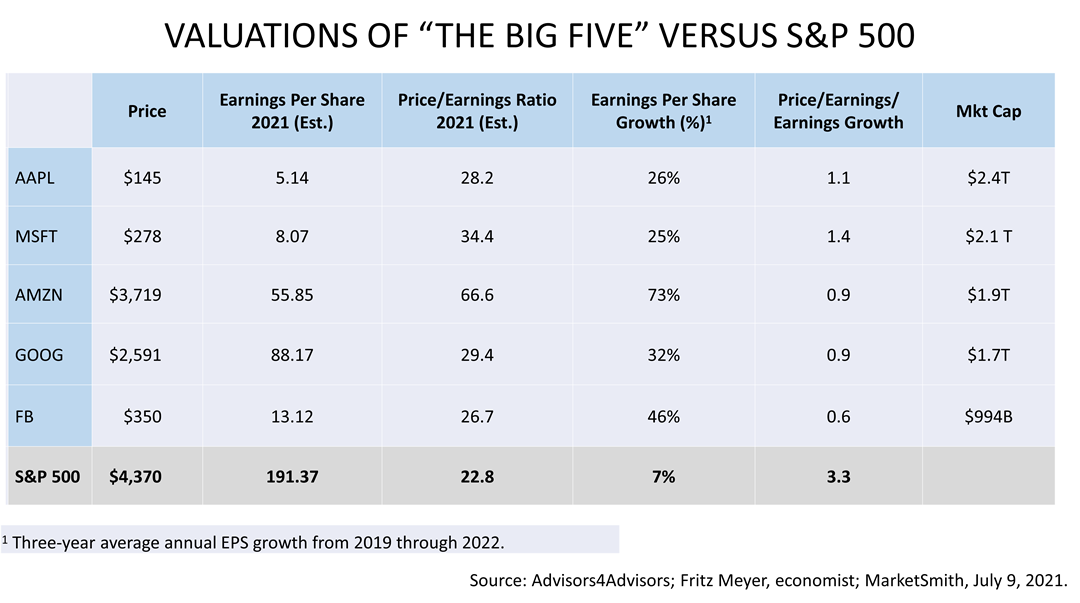
The most important measure of the financial strength of the United States is the Standard & Poor’s 500 stock index. It’s widely watched but constantly surprising. Of the 500 companies in the S&P 500, the five largest account for 21% of the total value of the much-watched index. You won’t believe where they are currently valued! Ranked by market capitalization, the five companies are: Apple, Microsoft, Amazon, Google, and Facebook. The Big Five are trading at low PEG ratios, relative to the other 495 stock stocks in the S&P 500 index. 
The average company in the S&P 500, as of July 9, traded at a PEG ratio of 3.3%, while the Big Five traded at a PEG ratio of just .98% -- a large discount to the other 500 companies in the S&P 500. Wikipedia attributes development of the PEG ratio to Mario Farina in a 1969 book. A PEG ratio is a company’s price/earnings ratio divided by its earnings growth rate for the next year. A PEG ratio adjusts the traditional price/earnings metric for valuing a company’s stock by accounting for its expected earnings growth rate. These five stocks may appear expensive relative to the S&P 500’s average P/E ratio of 22.8, but their earnings growth rate is reflected in the PEG ratios and they are cheap by this important metric relative to the other 495 companies in the index. For example, the expected earnings growth rate for Amazon is 73%. Amazon's PEG ratio is 0.9% versus the S&P 500's PEG ratio of 3.3. Stocks are risky investments and they are volatile. Just yesterday, the S&P 500 suffered its worst one-day decline since May, sliding more than 2% during the day before closing down 1.6%. The index shot back up by 1.5% today. Uncertainty about the risk of the Covid-19 variant as well as inflation are likely to cause big drops in the S&P 500 in the days ahead. Yet stocks are the growth engine of a retirement portfolio and a key in a comprehensive tax-smart investment plan built to last the rest of your life. With volatility high and tax laws about to change, please consider whether the next stock selloff could be a long-term planning opportunity. The table entitled, “Valuations Of ‘The Big Five’ Versus S&P 500,” was derived from a class for financial professionals by Fritz Meyer, an independent financial economist, on Advisors4Advisors on July 13, 2021. Nothing contained herein is to be considered a solicitation, research material, an investment recommendation, or advice of any kind, and it is subject to change without notice. Any investments or strategies referenced herein do not take into account the investment objectives, financial situation or particular needs of any specific person. Product suitability must be independently determined for each individual investor. Tax advice always depends on your particular personal situation and preferences. You should consult the appropriate financial professional regarding your specific circumstances. The material represents an assessment of financial, economic and tax law at a specific point in time and is not intended to be a forecast of future events or a guarantee of future results. Forward-looking statements are subject to certain risks and uncertainties. Actual results, performance, or achievements may differ materially from those expressed or implied. Information is based on data gathered from what we believe are reliable sources. It is not guaranteed as to accuracy, does not purport to be complete, and is not intended to be used as a primary basis for investment decisions. This article was written by a professional financial journalist for Advisor Products and is not intended as legal or investment advice. |